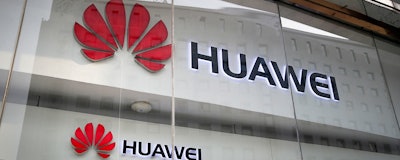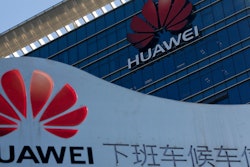
BEIJING (AP) — U.S. and other countries have not presented any conclusive evidence that Chinese telecoms gear maker Huawei Technologies threatens their national security and are merely stirring fears out of self-interest, a Chinese government spokeswoman said Wednesday.
Huawei's critics are conjuring up threats and misusing state power to "suppress the legitimate development rights and interests of Chinese enterprises" and are "using political means to intervene in the economy," said Foreign Ministry spokeswoman Hua Chunying.
"All countries should deal with relevant matters in an objective, comprehensive, rational, and correct manner, rather than fabricating excuses of all kinds for one's own pursuit of interest at the cost of others, which is quite hypocritical, immoral, and unfair," Hua said.
Hua's comments at a daily briefing were some of the sharpest yet in a growing feud over Washington's drive to convince other nations to shut Huawei out of their markets due to national security concerns.
Huawei is the world's biggest supplier of network gear used by phone and internet companies. It insists that it is independent and poses no threat to the security of others, but has long been seen by some as a front for spying by the Chinese military or security services.
On that basis, the United States, Australia, Japan and some other governments have imposed curbs on use of Huawei technology, including smart phones.
On Tuesday in Poland, U.S. Secretary of State Mike Pompeo renewed a warning that the United States may be forced to scale back certain operations in Europe and elsewhere if countries continue to do business with Huawei.
Pompeo said the U.S. had strong concerns about Huawei's motives in Europe, especially in NATO and European Union member states, as well as its business practices.
"We've made known the risks that are associated with that, risks to private information of citizens of the country, risks that comes from having that technology installed in network systems," he said.
The U.S. warnings about the risks of Chinese telecom technology come as governments are choosing providers for the rollout of 5G wireless internet, which will enable faster download speeds along with greater connectivity among devices.
U.S. officials argue that under Chinese security laws companies such as Huawei or ZTE could be compelled to hand over data or access to Chinese intelligence.
Hua said such concerns were based on provisions of China's national intelligence law that differ little from similar legislation in other countries.
"It is an international practice to maintain national security with legislation and to require organizations and individuals to cooperate with national intelligence work," Hua said.
Lacking solid evidence, the U.S. "keeps making up crimes and churning out various threat theories," Hua said.
"We believe that this is very hypocritical, unfair and immoral," she said. All nations, Hua said, have an obligation to "abide by the market principle of free and fair competition and truly safeguard the market environment of fairness, justice and non-discrimination."






















